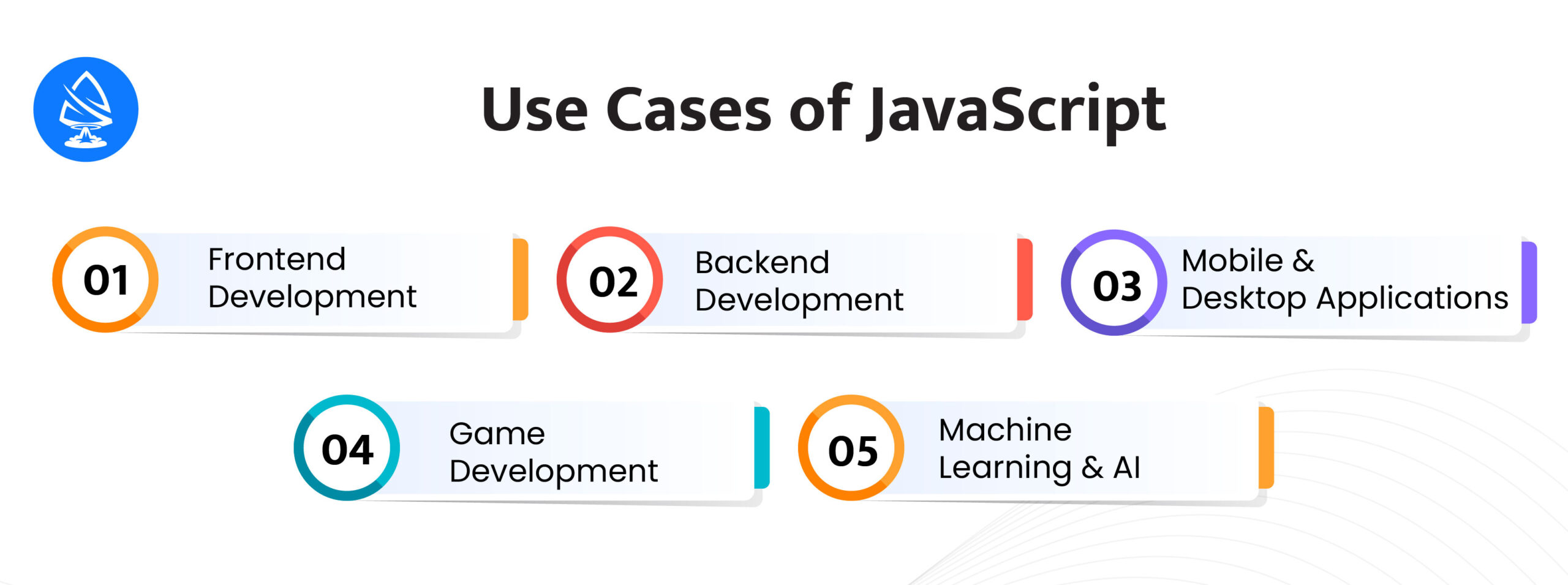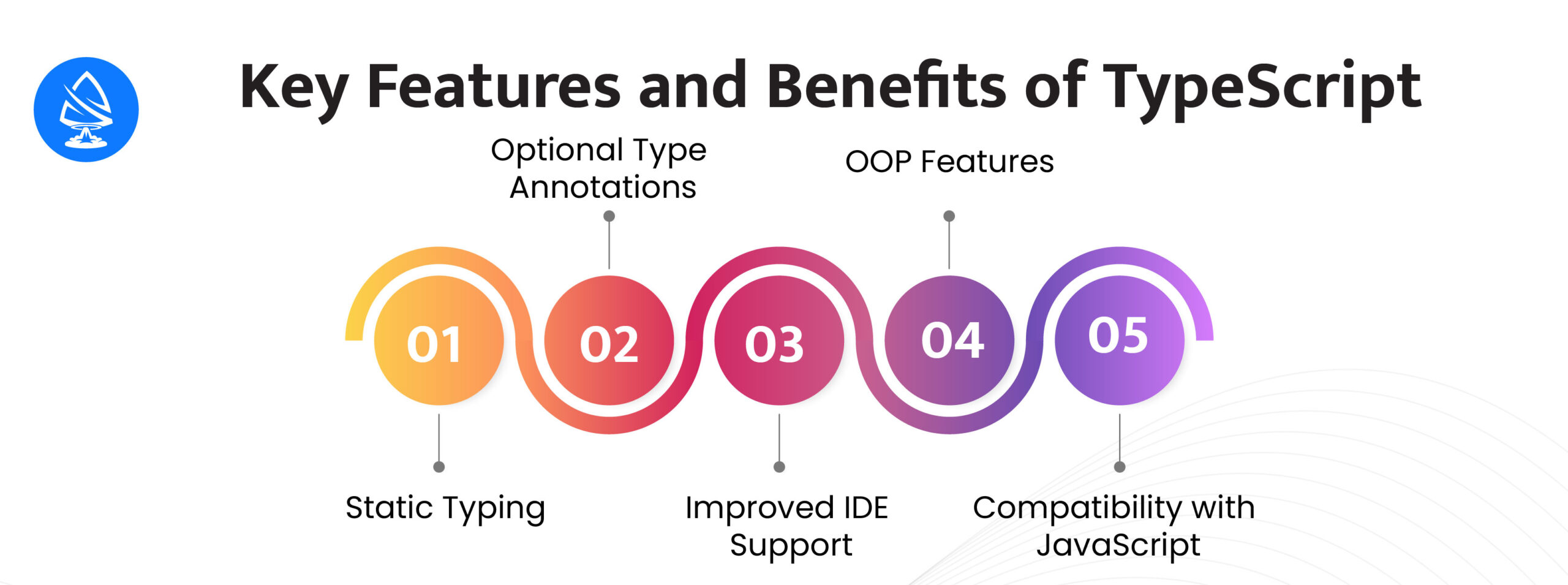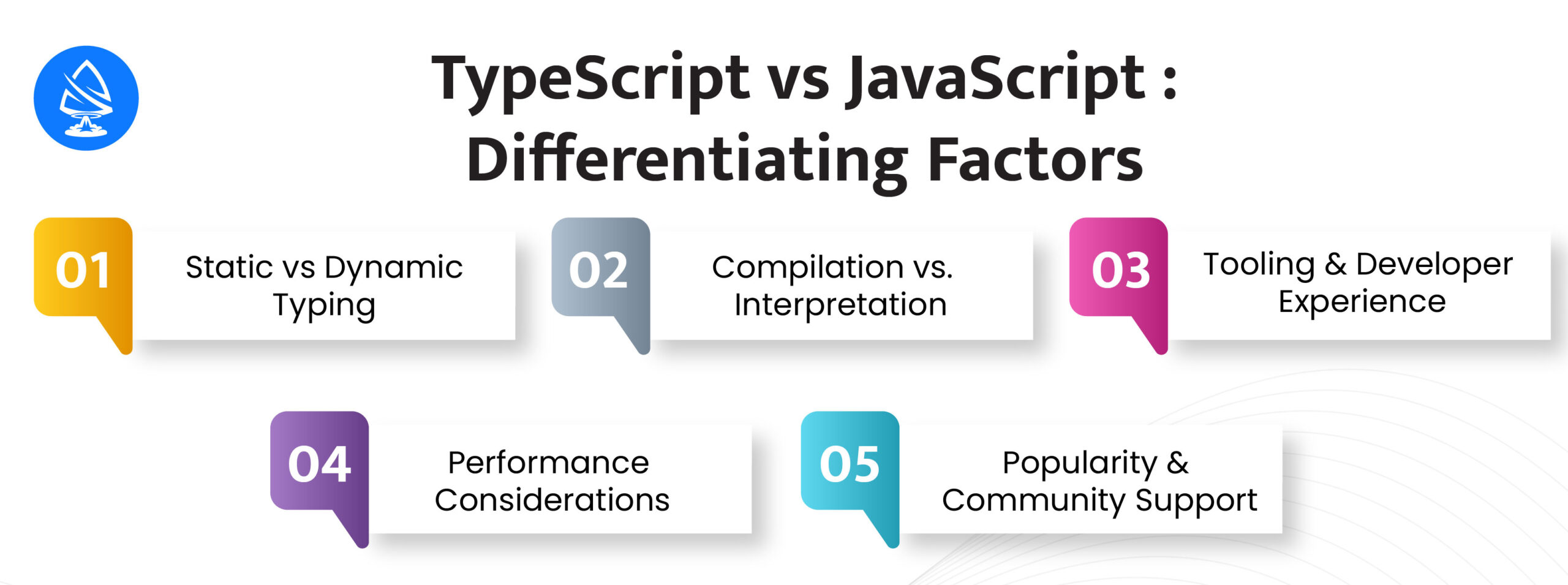In net growth, innovation and technical development are key to excel. Choosing a programming language is essential in profitable growth of advanced tasks. JavaScript has been the go-to programming language for builders for a very long time, however Typescript however has additionally emerged as a stable different with the superior options and capabilities. Typescript vs JavaScript is at present one of many hottest matters within the technical world.
On this weblog, we’ll discover the important thing variations between Typescript and JavaScript and discover out which one you need to use in 2025.
Let’s dive in.
What’s JavaScript?
In the case of net growth, JavaScript comes proper forward of every other programming language. It’s an interpreted programming language that permits builders to create interactive, dynamic, and responsive web sites. Launched in 1995 by Netscape, JavaScript shortly turned the usual scripting language for browsers.
Immediately, it’s a vital a part of net growth, working alongside HTML and CSS to boost person experiences. When evaluating ReactJS vs JavaScript, ReactJS is a library constructed on JavaScript, enabling builders to create environment friendly UI elements, whereas JavaScript itself serves because the core programming language for net functions.
The aim of JavaScript is to allow client-side scripting, permitting web sites to deal with person interactions, manipulate the DOM (Doc Object Mannequin), and talk with servers asynchronously via AJAX and Fetch API. It additionally powers trendy JavaScript frameworks like React.js, Angular, and Vue.js.
Use Circumstances and Recognition

JavaScript is among the most generally used programming languages, supporting each frontend and backend growth. Its versatility has made it a core expertise for full stack builders engaged on net functions.
1. Frontend Growth:
- Powers React.js, Angular, Vue.js, enabling dynamic and interactive UIs.
- Handles event-driven programming for person interactions.
- Helps animations, kind validation, and real-time updates.
2. Backend Growth (Node.js):
- JavaScript, mixed with Node.js, permits builders to construct scalable server-side functions.
- Frameworks like Categorical.js, NestJS, and Fastify allow strong backend growth.
3. Cell & Desktop Functions:
- With React Native and Ionic, JavaScript is used for cross-platform cell app growth.
- Electron.js permits JavaScript for use for desktop functions.
4. Sport Growth:
- Libraries like Phaser.js and Babylon.js allow web-based recreation growth.
5. Machine Studying & AI:
- Libraries like TensorFlow.js convey machine studying capabilities to JavaScript.
6. Recognition:
- JavaScript is probably the most used programming language globally (as per Stack Overflow Developer Surveys).
Main firms like Google, Fb, Netflix, and Airbnb depend on JavaScript for his or her platforms.
Strengths:
- Extremely Versatile: Works on frontend, backend, and even cell and desktop apps.
- Huge Adoption: Supported by all trendy browsers and extensively utilized in net growth.
- Massive Ecosystem: Big variety of JavaScript frameworks and libraries.
- Simple to Be taught: Newbie-friendly syntax in comparison with different programming languages.
- Asynchronous Processing: Helps event-driven programming for real-time functions.
Weaknesses:
- Loosely Typed: No strict sort enforcement, resulting in potential runtime errors.
- Safety Vulnerabilities: Inclined to cross-site scripting (XSS) and different safety threats.
- Efficiency Limitations: Slower than compiled languages like C++ and Java.
- Code Maintainability Points: Massive JavaScript tasks can turn out to be exhausting to handle with out finest practices.
JavaScript stays the muse of recent net growth, however as tasks scale, many builders flip to TypeScript for improved sort security and maintainability.
What’s TypeScript?
TypeScript is a strongly typed, object-oriented superset of JavaScript developed by Microsoft in 2012. It was created to deal with the shortcomings of JavaScript, notably in large-scale software growth. JavaScript, being dynamically typed, can result in errors which might be solely found at runtime, making it difficult to take care of and scale tasks.
TypeScript introduces static typing, interfaces, and higher tooling assist, serving to builders write cleaner, extra predictable, and maintainable code. Because it compiles right down to JavaScript, it stays totally suitable with the present JavaScript ecosystem whereas enhancing developer productiveness. When evaluating React JS vs React Native, TypeScript can be utilized with each, offering sort security and enhancing the event expertise for net and cell functions alike.
Key Options and Advantages

TypeScript extends JavaScript with highly effective options that enhance growth effectivity and code high quality.
1. Static Typing
- TypeScript makes use of static sort checking, which helps catch errors throughout growth relatively than at runtime.
- Reduces the probabilities of undefined errors and sudden conduct.
2. Optionally available Sort Annotations
- Builders can explicitly outline information varieties for variables, capabilities, and objects, enhancing code readability and decreasing bugs.
3. Improved IDE Assist
- TypeScript supplies higher autocompletion, clever code navigation, and error checking in IDEs like Visible Studio Code.
- Helps builders write code sooner with fewer errors.
4. Object-Oriented Programming (OOP) Options
- TypeScript introduces interfaces, lessons, and inheritance, making it simpler to construct structured functions.
5. Compatibility with JavaScript
- TypeScript can run alongside JavaScript, permitting builders to incrementally migrate tasks as an alternative of rewriting total functions.
- Current JavaScript code may be transformed to TypeScript with minimal effort.
Progress and Adoption Traits
1. Widespread Trade Adoption:
- TypeScript is extensively utilized in trendy frameworks like Angular, React, and Vue.js, in addition to backend growth with Node.js.
- Firms like Microsoft, Google, Airbnb, and Slack have adopted TypeScript for large-scale tasks.
2. Developer Choice & Recognition:
- In accordance with the Stack Overflow Developer Survey 2024, TypeScript continues to rank among the many most cherished and most used programming languages.
- Many new open-source tasks default to TypeScript for its maintainability and robustness.
3. Rising Ecosystem & Group Assist:
- In style libraries like Redux, Subsequent.js, and Apollo Shopper now present built-in TypeScript assist.
- Extra builders are shifting to TypeScript because of its robust neighborhood assist and long-term viability.
TypeScript vs JavaScript: Key Variations

JavaScript and TypeScript are each important for contemporary net growth, however they’ve vital variations that influence React JS growth, full stack builders, and JavaScript frameworks. Under is an in depth comparability:
1. Static vs. Dynamic Typing
JavaScript (Dynamic Typing)
- JavaScript is a dynamically typed language, which means variables do not need fastened information varieties.
- A variable can maintain any information sort and alter its sort throughout execution.
Instance:
| let information = “Good day”; information = 10; // No error, sort adjustments dynamically |
Situation: This flexibility usually results in runtime errors, making debugging tougher, particularly in large-scale React JS growth tasks.
TypeScript (Static Typing)
- TypeScript enforces static typing, which means variables will need to have an outlined sort.
- TypeScript catches errors at compile-time, decreasing sudden points.
Instance:
| let information: string = “Good day”; information = 10; // Error: Sort ‘quantity’ just isn’t assignable to sort ‘string’. |
Profit: A full stack growth working with massive JavaScript frameworks like Angular or Subsequent.js advantages from sort security, decreasing debugging time and enhancing maintainability.
2. Compilation vs. Interpretation
JavaScript (Interpreted Language)
- JavaScript is interpreted by browsers, which means code runs straight with out compilation.
- This makes growth sooner however will increase the chance of runtime errors.
TypeScript (Compiled to JavaScript)
- Whereas executing TypeScript, it’s essential to compile it into JavaScript first.
- This extra step ensures error detection earlier than runtime.
- Makes use of tsc (TypeScript Compiler) to transpile code into browser-compatible JavaScript.
Benefit for JavaScript Frameworks: TypeScript ensures early error detection, enhancing code high quality for React JS growth and full stack functions.
Downside: Compilation introduces an extra construct step, making growth barely slower.
3. Tooling and Developer Expertise
JavaScript
- Works out of the field with browsers and doesn’t require further setup.
- In style in full stack growth with Node.js, Categorical.js, and React JS growth.
- Debugging may be difficult because of lack of static typing.
TypeScript
- Gives higher tooling assist in IDEs like VS Code, enabling:
- Autocomplete (IntelliSense)
- Code navigation (Go to Definition, Discover References)
- Actual-time error checking
- TypeScript may be simply built-in with JavaScript frameworks like React, Angular, and Vue.js.
- Extra structured and simpler to refactor in large-scale functions.
Profit: Full stack builders choose TypeScript for maintainability and scalability in enterprise-level tasks.
Downside: Requires preliminary configuration with `tsconfig.json`, which provides complexity.
4. Efficiency Concerns
JavaScript
- Immediately executed in browsers, making it sooner throughout growth.
- Efficiency is dependent upon JavaScript engines (V8, SpiderMonkey, and so on.).
TypeScript
- Introduces a compilation overhead, however doesn’t influence runtime efficiency.
- Generates optimized JavaScript, enhancing efficiency in massive functions.
- Some options (like sort checking) exist solely at compile time, which means they don’t decelerate runtime execution.
Downside: Compilation provides further processing time for full stack builders engaged on massive React JS tasks.
Benefit: TypeScript results in fewer runtime errors, decreasing debugging-related delays.
5. Recognition and Group Assist
JavaScript
- One of the crucial extensively used programming languages worldwide.
- Utilized in nearly all JavaScript frameworks, together with React, Vue.js, and Angular.
- Large neighborhood assist with hundreds of thousands of builders.
TypeScript
- Quickly rising in recognition, particularly amongst enterprise functions and full stack builders.
- Broadly adopted in React JS growth, Node.js, and Subsequent.js.
- Supported by main firms like Microsoft, Google, and Airbnb.
- In accordance with the Stack Overflow Developer Survey 2024, TypeScript is among the many most cherished languages.
Benefit: TypeScript is turning into the popular alternative for scalable functions.
Downside: JavaScript nonetheless has a bigger neighborhood and ecosystem, making it simpler to search out libraries and assist.
Which One Is Higher for Completely different Use Circumstances?
To select from the distinction of TypeScript vs JavaScript is dependent upon the precise mission necessities, scalability wants, and developer expertise.
Let’s discover which one is healthier for various use circumstances, together with ReactJS growth providers, backend functions, and enterprise options.
1. Frontend Growth: React, Angular, Vue.js
Frontend frameworks like React, Angular, and Vue.js have seen widespread adoption, and each JavaScript and TypeScript play essential roles of their ecosystem.
JavaScript for Frontend Growth
- Greatest for: Small tasks, fast prototypes, and learners.
- JavaScript is right for quick growth with minimal setup.
- Works seamlessly with all frontend frameworks (React, Angular, Vue.js).
- Really useful for builders preferring a light-weight, versatile coding type.
TypeScript for Frontend Growth
- Greatest for: Massive-scale tasks, enterprise functions, and group collaboration.
- TypeScript enhances ReactJS growth providers by including sort security and higher debugging assist.
- Gives robust IDE integration, making it simpler to navigate advanced tasks.
- Works exceptionally nicely with Angular, which is constructed with TypeScript by default.
Verdict:
- For small-scale tasks → JavaScript is adequate.
- For skilled ReactJS growth providers → TypeScript is the higher alternative.
2. Backend Growth: Node.js with JavaScript or TypeScript
Backend growth with Node.js is a significant consideration for full stack builders.
JavaScript for Backend (Node.js, Categorical.js)
- Greatest for: Light-weight APIs, easy backend providers, and fast deployment.
- JavaScript is simple to arrange and generally used with Node.js frameworks like Categorical.js.
- Very best for MVPs and startups that require fast backend growth.
TypeScript for Backend (Node.js, NestJS)
- Greatest for: Enterprise-grade functions, large-scale APIs, and structured backends.
- Sort security reduces runtime errors, making code extra dependable.
- Works nicely with NestJS, a TypeScript-based backend framework for scalable functions.
- Most well-liked by massive groups because of its maintainability and debugging capabilities.
Verdict:
- For easy backend functions → JavaScript is adequate.
- For advanced APIs and enterprise functions → TypeScript is the higher alternative.
3. Enterprise Functions vs. Startups
Enterprise functions and startups have completely different priorities when selecting a expertise stack.
JavaScript for Startups
- Greatest for: MVP growth, fast iterations, and budget-friendly options.
- JavaScript permits startups to construct and launch merchandise shortly.
- Simple to rent JavaScript builders because of its bigger neighborhood.
- Works nicely with trendy JavaScript frameworks like Subsequent.js for server-side rendering.
TypeScript for Enterprises
- Greatest for: Scalability, maintainability, and enormous growth groups.
- TypeScript prevents bugs in massive codebases, decreasing long-term upkeep prices.
- Improves code consistency, which is crucial for enterprise-grade software program.
- Utilized by main companies like Microsoft, Google, and Airbnb for large-scale functions.
Verdict:
- For early-stage startups → JavaScript ensures sooner growth.
- For enterprise functions → TypeScript supplies higher long-term stability.
4. Efficiency-Intensive Functions
Functions that require excessive efficiency and real-time execution should take into account the trade-offs between JavaScript and TypeScript.
JavaScript for Efficiency-Intensive Functions
- Greatest for: Excessive-speed execution, light-weight scripts, and recreation growth.
- JavaScript runs straight in browsers, making it sooner for real-time functions.
- Very best for performance-heavy front-end experiences, like gaming engines (e.g., Babylon.js).
TypeScript for Efficiency-Intensive Functions
- Greatest for: Massive-scale apps the place debugging and maintainability are essential.
- TypeScript provides compilation overhead, however reduces runtime errors, enhancing stability.
- Utilized in real-time functions like monetary buying and selling platforms and IoT techniques.
Verdict:
- For uncooked efficiency and light-weight functions → JavaScript is healthier.
- For giant-scale performance-critical functions → TypeScript supplies higher debugging and maintainability.
Conclusion
JavaScript and TypeScript every have their strengths. JavaScript is finest for small tasks, startups, and light-weight functions, providing flexibility and velocity. TypeScript, however, is right for ReactJS growth providers, enterprise functions, and large-scale tasks, offering sort security, higher debugging, and maintainability.
For fast prototypes or easy scripts, JavaScript stays a powerful alternative. Nevertheless, full stack builders working with JavaScript frameworks ought to take into account TypeScript for its scalability and error prevention.
As TypeScript adoption grows, it’s more likely to turn out to be the trade customary, particularly for giant functions. Nevertheless, JavaScript will proceed evolving, sustaining its dominance in net growth.
So, are you in search of a dependable cell app growth companion?
Allow us to take your tasks to new heights be it web sites, cell functions or net apps. Verify our Reactjs Growth Companies and rent react js builders, net developer, or JavaScript developer as per your necessities.
Contact us now!
FAQs
1. Is TypeScript sooner than JavaScript?
No, TypeScript introduces a compilation step, making growth barely slower. Nevertheless, it improves debugging and maintainability, which might velocity up growth in the long term.
2. Ought to I study TypeScript or JavaScript first?
Be taught JavaScript first, as TypeScript is a superset of JavaScript. A robust basis in JavaScript makes it simpler to grasp TypeScript’s further options.
3. Is TypeScript higher for ReactJS growth providers?
Sure, TypeScript enhances ReactJS growth providers by including sort security, higher code group, and fewer runtime errors.
4. Can I take advantage of TypeScript for backend growth?
Sure, TypeScript works nicely with Node.js and backend frameworks like NestJS, making it excellent for large-scale backend functions.
5. Will TypeScript substitute JavaScript sooner or later?
Unlikely. Whereas TypeScript adoption is rising, JavaScript stays important for net growth because of its common browser assist.




